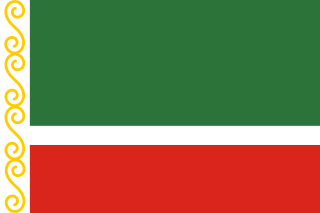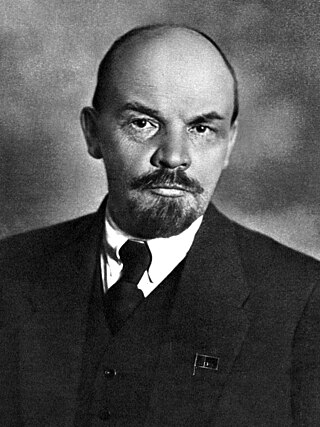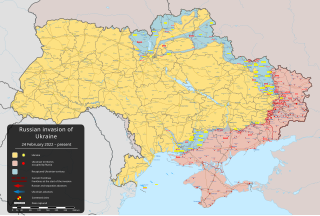
Chechnya, officially the Chechen Republic, is a republic of Russia. It is situated in the North Caucasus of Eastern Europe, between the Caspian Sea and Black Sea. The republic forms a part of the North Caucasian Federal District, and shares land borders with Georgia to its south; with the Russian republics of Dagestan, Ingushetia, and North Ossetia–Alania to its east, north, and west; and with Stavropol Krai to its northwest.

Moscow is the capital and largest city of Russia. The city stands on the Moskva River in Central Russia, with a population estimated at over 13 million residents within the city limits, over 18.8 million residents in the urban area, and over 21.5 million residents in its metropolitan area. The city covers an area of 2,511 square kilometers (970 sq mi), while the urban area covers 5,891 square kilometers (2,275 sq mi), and the metropolitan area covers over 26,000 square kilometers (10,000 sq mi). Moscow is among the world's largest cities, being the most populous city in its entirety in Europe, the largest urban and metropolitan area in Europe, and the largest city by land area on the European continent.

Russia, or the Russian Federation, is a country spanning Eastern Europe and North Asia. It is the largest country in the world by area, extending across eleven time zones and sharing land borders with fourteen countries. It is the world's ninth-most populous country and Europe's most populous country. Russia is a highly urbanised country including 16 population centres with over a million inhabitants. Its capital and largest city is Moscow. Saint Petersburg is Russia's second-largest city and its cultural capital.
Russian is an East Slavic language belonging to the Balto-Slavic branch of the Indo-European language family. It is one of the four extant East Slavic languages, and is the native language of the Russians. It was the de facto and de jure official language of the former Soviet Union. Russian has remained an official language of the Russian Federation, Belarus, Kazakhstan, Kyrgyzstan, and Tajikistan, and is still commonly used as a lingua franca in Ukraine, Moldova, the Caucasus, Central Asia, and to a lesser extent in the Baltic states and Israel.

The Union of Soviet Socialist Republics (USSR), commonly known as the Soviet Union, was a transcontinental country that spanned much of Eurasia from 1922 to 1991. During its existence, it was the largest country by area, extending across eleven time zones and sharing borders with twelve countries, and the third-most populous country. An overall successor to the Russian Empire, it was nominally organized as a federal union of national republics, the largest and most populous of which was the Russian SFSR. In practice, its government and economy were highly centralized. As a one-party state governed by the Communist Party of the Soviet Union, it was a flagship communist state. Its capital and largest city was Moscow.

Ukraine is a country in Eastern Europe. It is the second-largest European country after Russia, which borders it to the east and northeast. It also borders Belarus to the north; Poland and Slovakia to the west; Hungary, Romania and Moldova to the southwest; with a coastline along the Black Sea and the Sea of Azov to the south and southeast. Kyiv is the nation's capital and largest city, followed by Kharkiv, Dnipro, and Odesa. Ukraine's official language is Ukrainian.

Vladimir Vladimirovich Putin is a Russian politician and former intelligence officer who is the president of Russia. Putin has held continuous positions as president or prime minister since 1999: as prime minister from 1999 to 2000 and from 2008 to 2012, and as president from 2000 to 2008 and from 2012 onward. He is the longest-serving Russian or Soviet leader since Joseph Stalin.

Catherine II, most commonly known as Catherine the Great, was the reigning Empress of Russia from 1762 to 1796. She came to power after overthrowing her husband, Peter III. Under her long reign, inspired by the ideas of the Enlightenment, Russia experienced a renaissance of culture and sciences, which led to the founding of many new cities, universities, public libraries and theatres. At that time Russia became the new homeland for hundreds of thousands of European immigrants, and became recognized as one of the great powers of Europe.

Peter I, was Tsar of all Russia from 1682, and the first Emperor of all Russia, known as Peter the Great, from 1721 until his death in 1725. He reigned jointly with his half-brother Ivan V until 1696. From this year, Peter was an absolute monarch, an autocrat who remained the ultimate authority and organized a well-ordered police state.

The Crimean War was fought from October 1853 to February 1856 between the Russian Empire and an ultimately victorious alliance of the Ottoman Empire, France, the United Kingdom, and Sardinia-Piedmont.

Georgia is a transcontinental country in Eastern Europe and West Asia. It is part of the Caucasus region, bounded by the Black Sea to the west, Russia to the north and northeast, Turkey to the southwest, Armenia to the south, and Azerbaijan to the southeast. Georgia covers an area of 69,700 square kilometres (26,900 sq mi). It has a population of 3.7 million, of which over a third live in the capital and largest city, Tbilisi. Georgians, who are native to the region, constitute a majority of the country's population and are its titular nation.

The federal subjects of Russia, also referred to as the subjects of the Russian Federation or simply as the subjects of the federation, are the constituent entities of Russia, its top-level political divisions. According to the Constitution of Russia, the federation consists of republics, krais, oblasts, cities of federal importance, an autonomous oblast, and autonomous okrugs, all of which are equal subjects of the federation.

Dagestan, officially the Republic of Dagestan, is a republic of Russia situated in the North Caucasus of Eastern Europe, along the Caspian Sea. It is located north of the Greater Caucasus, and is a part of the North Caucasian Federal District. The republic is the southernmost tip of Russia, sharing land borders with the countries of Azerbaijan and Georgia to the south and southwest, the Russian republics of Chechnya and Kalmykia to the west and north, and with Stavropol Krai to the northwest. Makhachkala is the republic's capital and largest city; other major cities are Derbent, Kizlyar, Izberbash, Kaspiysk, and Buynaksk.

Vladimir Ilyich Ulyanov, better known as Vladimir Lenin, was a Russian revolutionary, politician and political theorist. He served as the first and founding head of government of Soviet Russia from 1917 until his death in 1924, and of the Soviet Union from 1922 to 1924. Under his administration, Russia, and later the Soviet Union, became a one-party socialist state governed by the Communist Party of the Soviet Union (CPSU). Ideologically a Marxist, his developments to the ideology are called Leninism.

The Russian Empire was a vast empire that spanned most of northern Eurasia from its proclamation in November 1721 until the proclamation of the Russian Republic in September 1917. At its height in the late 19th century, it covered about 22,800,000 square kilometres (8,800,000 sq mi), roughly one-sixth of the world's landmass, making it the third-largest empire in history, behind only the British and Mongol empires. It also held colonies in North America between 1799 and 1867. The empire's 1897 census, the only one it conducted, found a population of 125.6 million with considerable ethnic, linguistic, religious, and socioeconomic diversity.

Saint Petersburg, formerly known as Petrograd and later Leningrad, is the second-largest city in Russia after Moscow. It is situated on the River Neva, at the head of the Gulf of Finland on the Baltic Sea. The city had a population of 5,601,911 residents as of 2021, with more than 6.4 million people living in the metropolitan area. Saint Petersburg is the fourth-most populous city in Europe, the most populous city on the Baltic Sea, and the world's northernmost city of more than 1 million residents. As the former capital of Imperial Russia, and a historically strategic port, it is governed as a federal city.

The Russian Soviet Federative Socialist Republic, previously known as the Russian Soviet Republic and the Russian Socialist Federative Soviet Republic, and unofficially as Soviet Russia, was an independent federal socialist state from 1917 to 1922, and afterwards the largest and most populous constituent republic of the Soviet Union (USSR) from 1922 to 1991, until becoming a sovereign part of the Soviet Union with priority of Russian laws over Union-level legislation in 1990 and 1991, the last two years of the existence of the USSR. The Russian SFSR was composed of sixteen smaller constituent units of autonomous republics, five autonomous oblasts, ten autonomous okrugs, six krais and forty oblasts. Russians formed the largest ethnic group. The capital of the Russian SFSR and the USSR as a whole was Moscow and the other major urban centers included Leningrad, Stalingrad, Novosibirsk, Sverdlovsk, Gorky and Kuybyshev. It was the first socialist state in history.

Nicholas II or Nikolai II was the last reigning Emperor of Russia, King of Congress Poland, and Grand Duke of Finland from 1 November 1894 until his abdication on 15 March 1917. He married Alix of Hesse in 1894 and had children Olga (1895), Tatiana (1897), Maria (1899), Anastasia (1901) - collectively known as the OTMA sisters - and the tsarevich Alexei Nikolaevich.

The ongoing Russo-Ukrainian War began in February 2014. Following Ukraine's Revolution of Dignity, Russia occupied and annexed Crimea from Ukraine and supported pro-Russian separatists fighting the Ukrainian military in the Donbas War. These first eight years of conflict also included naval incidents and cyberwarfare. In February 2022, Russia launched a full-scale invasion of Ukraine and began occupying more of the country, starting the biggest conflict in Europe since World War II. The war has resulted in a refugee crisis and tens of thousands of deaths.

On 24 February 2022, Russia invaded Ukraine in a major escalation of the Russo-Ukrainian War, which started in 2014. The invasion, the largest conflict in Europe since World War II, has caused hundreds of thousands of military casualties and tens of thousands of Ukrainian civilian casualties. As of 2024, Russian troops occupy about 20% of Ukraine. From a population of 41 million, about 8 million Ukrainians had been internally displaced and more than 8.2 million had fled the country by April 2023, creating Europe's largest refugee crisis since World War II.


















